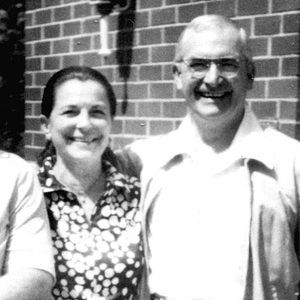calsfoundation@cals.org
Virginia Lillian Morris Johnson (1928–2007)
Virginia Lillian Morris Johnson was the first woman to run for the office of governor in Arkansas. Running as a conservative Democrat, Johnson campaigned against six other Democrats, all male, vying to be the candidate to run against the Republican incumbent, Winthrop Rockefeller, in the gubernatorial race of 1968.
Virginia Lillian Morris was born on January 21, 1928, in Conway (Faulkner County) to Jesse Lyman Morris Sr. and Frances Morgan Morris. Her family later moved to El Paso (White County). Upon the death of her mother when she was fourteen, Morris moved to Bee Branch (Van Buren County) to live with relatives while her father served in the U.S. Marine Corps. Following her graduation from Southside High School in Bee Branch, Morris received a scholarship to study at Draughon’s School of Business in Little Rock (Pulaski County). After graduation, she was employed as a secretary at the law firm of Carter, Pickthorne, and Jones. Later, she worked as an under-insurance secretary for William E. Terry of Little Rock.
On December 21, 1947, Johnson married James (Jim) Johnson, a lawyer practicing in Crossett (Ashley County). They had three sons and later settled permanently near Beaverfork Lake, outside of Conway. Following Jim Johnson’s election to the Arkansas Senate, she served on the Senate staff during the 1951 and 1953 legislative sessions. She was chairman of her husband’s petition drive in 1956 to put a proposed state constitutional amendment on the ballot calling for the legislature “to pass laws opposing in every constitutional manner” the U.S. Supreme Court’s decisions for school desegregation. It remained in place until officially repealed in 1990, though Johnson never wavered in her support of it, writing in a March 2005 letter to the Arkansas Democrat-Gazette, “The people of Arkansas have solid convictions and, if offered the opportunity, they will demonstrate once again that they prefer their own.” She helped her husband campaign for various offices, including his 1956 failed campaign for governor and his successful 1958 campaign for a spot on the Arkansas Supreme Court.
On April 30, 1968, Johnson filed for the office of governor. Her husband, who lost in the gubernatorial race to Winthrop Rockefeller in 1966, reportedly urged her to run. A self-proclaimed “true conservative,” Johnson often called herself the “people’s candidate,” and a popular theme throughout her campaign was her promise that she was free of machine politics. She promised to run the state with “housewife efficiency.” Her platform included promises to oppose gambling and any measure legalizing mixed drinks—two issues that were heatedly debated at that time. She also supported raising teachers’ salaries “as much and as rapidly as possible,” as well as increasing per capita income in the state, which she called the state’s most important issue. She also promised to restore a “moral tone” to the office of the governor.
Johnson was often asked why a woman would make a good governor, and time and time again, Johnson replied, “Why not?” One local reporter noted that she was “the only novelty in a rather dull campaign.”
On July 31, 1968, Johnson came in second in the Democratic primary, defeating Ted Boswell of Bryant (Saline County) by only 409 votes. She faced Marion Crank in the Democratic run-off on August 13. In her first television appearance following the initial primary, Johnson made the unusual step of calling on young voters to participate, promising to include them if she were to succeed in obtaining the gubernatorial office. She also bought advertisements in the Southern Mediator Journal, an African-American publication in Little Rock, even though she strongly supported maintaining the status quo for most of the state, where schools remained segregated.
In the weeks before the run-off, Johnson increased her claims that her opponent was tied to political bosses around the state and vowed that she remained untied to this political machine. She also called Governor Winthrop Rockefeller’s two years in office “futile follies” and “a comedy of errors.” She often criticized the governor for bringing “outsiders” to run many of the state’s offices.
Johnson lost the Democratic nomination to Crank, who captured sixty-four percent of the vote, with turnout reported as light. Johnson vowed to help Crank unseat the governor but later renounced her support. Rockefeller was reelected.
On September 17, 1968, Johnson turned down an offer to serve on the state Democratic Committee on Revision of Party Rules because of the committee’s intention to force local Democrats to give support to national Democratic candidates. She was a supporter of Alabama governor George Wallace, a stalwart segregationist and an American Independent Party candidate for the president in 1968. When the committee passed the rule, Johnson renounced her support of all state Democrats.
Though Johnson never ran for additional offices, she and her husband remained in the political spotlight while her husband served as a state Supreme Court justice. She died at her home in Conway on June 27, 2007, and is buried in Oak Grove Cemetery in Conway. Her husband died in 2010.
For additional information:
Obituary of Virginia Lillian Morris Johnson. Arkansas Democrat-Gazette. June 29, 2007, p. 7B.
Parry, Janine A. “‘The Nice Lady’ of Arkansas Politics: Virginia Johnson and the 1968 Governor’s Race.” Arkansas Historical Quarterly 78 (Winter 2019): 365–408.
Simmons, Bill, and Pryor Jordan. “Virginia Johnson Dies; Political Pioneer was 79.” Arkansas Democrat-Gazette, June 30, 2007, pp. 1B, 7B.
Sarah E. Blair
Fayetteville, Arkansas
Staff of the CALS Encyclopedia of Arkansas

 Virginia and Jim Johnson
Virginia and Jim Johnson  Virginia Johnson Campaign Fan
Virginia Johnson Campaign Fan 



Comments
No comments on this entry yet.